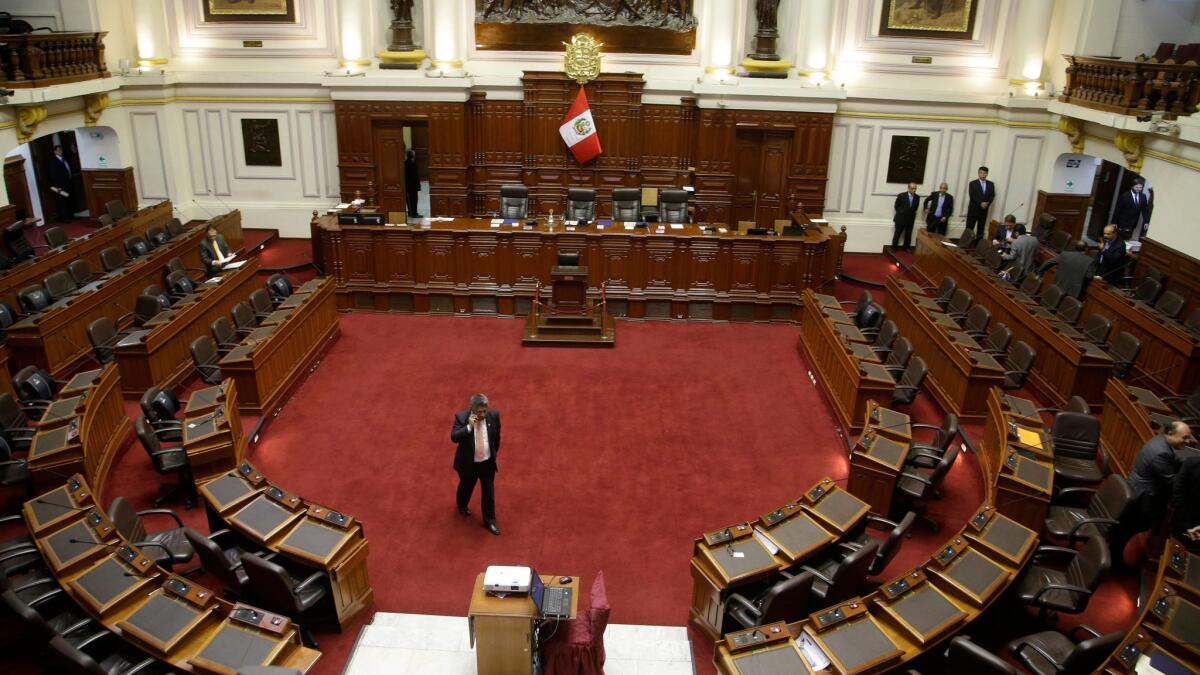Peru launches impeachment proceedings against President Kuczynski

- Share via
Reporting from LIMA, Peru — Lawmakers in Peru initiated impeachment proceedings Friday against President Pedro Pablo Kuczynski, who is accused of failing to disclose decade-old payments from a Brazilian company embroiled in Latin America’s biggest corruption scandal.
In a special session Friday, 27 of 130 members of Congress approved launching the process to oust the president, who has denied wrongdoing.
“I’m not running and I’m not hiding because I have no reason to,” the former Wall Street investor said in a televised address late Thursday, vowing to produce his personal banking records for public scrutiny. “I’m not going to abdicate my honor, my values or my responsibilities as president of all Peruvians.”
Kuczynski said he had no management duties in his consulting firm between 2004 and 2007 when it received $782,000 from a consortium led by Odebrecht, the Brazilian company. During much of that time, he was a Cabinet minister in a previous government that awarded Odebrecht a major highway contract.
The president also said all of the payments were made to his business partner at the consulting firm, Westfield Capital.
Kuczynski’s impassioned address ended a 24-hour period of political turbulence that started Wednesday as opposition lawmakers presented documents provided by Odebrecht showing payments to Westfield as well as $4 million to another firm, First Capital, owned by the same business partner.
Peru’s two biggest parties, which have enough seats in Congress to remove Kuczynski, had threatened the impeachment proceedings unless the president stepped down.
“The country right now can’t afford the luxury of having a president that is so questioned,” said Daniel Salaverry, a spokesman for the opposition Popular Force party.
As recently as last month, Kuczynski had denied having any professional or political ties to Odebrecht and wagged his finger at three predecessors accused of taking bribes from the company.
Kuczynski said all of his earnings from Westfield were duly reported to Peru’s tax authority. Of the $4 million in payments to First Capital, he said only a single transaction, for which he held up an invoice, was for financial consulting services he provided the firm in 2012 as part of its work on an Odebrecht-owned irrigation project.
“I’m an honest man and have been all my life,” he said.
Authorities across Latin America have moved swiftly to charge politicians accused of taking some $800 million in bribes that Odebrecht acknowledged paying in a 2016 plea agreement with the U.S. Justice Department. The graft included some $29 million paid in Peru during the 2001-06 administration of President Alejandro Toledo and two of his successors. Kuczynski served as Toledo’s finance chief and prime minister.
Kuczynski spent most of Thursday holed up in the presidential palace with top aides trying to devise a strategy to fight back. As rumors swirled he would resign, Peru’s stock exchange — until recently a favorite of foreign investors — had its biggest tumble in two years, falling 3.5%.
Kuczynski, 79, was elected president in 2016 after a lucrative career in business. He campaigned on a pledge to clean up corruption and provide much-needed stability in one of South America’s most politically volatile nations.
But Peruvians are unlikely to be convinced by his reassurances that he did nothing wrong, analysts said.
Steve Levitsky, a Harvard University political scientist who has spent years studying Peru, said Kuczynski was already a weak president with little legislative or popular support before the corruption allegations, which had been quietly dogging him for some time.
“He definitely seems to be dead in the water,” said Levitsky. “It’s not that what he did was necessarily illegal, but the fact that he swore over and over again that he had no ties to Odebrecht and that was proven to be nakedly false.”
Reflecting his tenuous grip on power, Kuczynski on Wednesday agreed to meet with a congressional committee investigating Odebrecht’s ties to politicians — something he had earlier refused to do. Peru’s chief prosecutor’s office also said Thursday it was initiating an investigation even though it can’t indict a sitting president.
El Comercio, the nation’s largest newspaper, summed up the uncertainty threatening Peru in an editorial Thursday.
“The undesirable scenario of a presidential vacancy is dangerously close,” said the newspaper, which supported Kuczynski in the 2016 election. “And unfortunately the person who most contributed to putting us in this ominous trance — taking with it loyal collaborators who trusted him blindly — is the head of state himself with his ambiguous, drip-drip revelations.”
More to Read
Sign up for Essential California
The most important California stories and recommendations in your inbox every morning.
You may occasionally receive promotional content from the Los Angeles Times.












